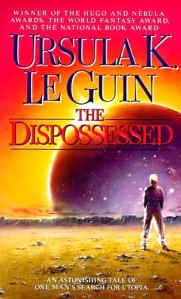Review – The Dispossessed by Ursula K. Le Guin
I had intended to present a lovely piece of poetry today, full of meaning and imagery beautiful enough to moisten even the driest, most Internet-weary eye. Unfortunately, fatigue and workplace politics have dampened the wood in my fireplace of creativity, so instead you get my amateurish review of science fiction classic The Dispossessed by Ursula K. Le Guin. My review format will be shamelessly lifted from that book-devouring badass Amanda Rutter over at Floor-to-Ceiling Books.
 Shevek, a brilliant physicist, decides to take action. He will seek answers, question the unquestionable, and attempt to tear down the walls of hatred that have isolated his planet of anarchists from the rest of the civilized universe. To do this dangerous task will mean giving up his family and possibly his life. Shevek must make the unprecedented journey to the utopian mother planet, Urras, to challenge to complex structures of life and living, and ignite the fires of change.
Shevek, a brilliant physicist, decides to take action. He will seek answers, question the unquestionable, and attempt to tear down the walls of hatred that have isolated his planet of anarchists from the rest of the civilized universe. To do this dangerous task will mean giving up his family and possibly his life. Shevek must make the unprecedented journey to the utopian mother planet, Urras, to challenge to complex structures of life and living, and ignite the fires of change.
In Shevek, Le Guin has fashioned a very sympathetic and likeable main character: he is brilliant, socially awkward, and decidedly unusual-looking. In other words, the poster boy for nerds far and wide. Being one myself (though not nearly as accomplished as most), I couldn’t help but be drawn in by him from the start. The book begins with him hitching a ride on an offworld freighter, so we are introduced to his nature while he himself is coping with entirely foreign circumstances, and we (or I, at least) like him immediately.
Unfortunately, Shevek ends up being the only character with this kind of appeal and depth. His wife Takver has potential, but she enters the story late and so is deprived of much-needed exposure. Similarly, the servant Efor hints at unexplored fathoms that remain unexplored by the book’s conclusion. The remainder of the characters, both the anarchists of Anarres and the “propertarians” of Urras, occupy a relatively two-dimensional space. They operate as placeholders for the various political and economic ideologies that Le Guin kicks around: the altruistic anarchist; the manipulative, profit-minded capitalist; the aging, eccentric academician; and the polished, reserved ambassador. They function well as icons but fall short as characters.
The plot also suffers in service of the author’s message. The book oscillates between Shevek’s present and past with each chapter, but the majority of the interesting events occur in the past. The present narrative doesn’t pick up for nearly three-fourths of the book, and Takver’s absence makes it more an exercise in observing Shevek reacting to capitalist ideas than in meaningful character interactions.
The trade-off for all of this, however, is an in-depth exploration of differing economic and political models, which Le Guin handles very well. She teases out the benefits and pitfalls of philanthropic anarchism in the past narrative, placing it in stark relief against the unshackled capitalism of Shevek’s present world. His naivete turns to bitter disappointment and despair as he learns the truth of the propertarian way of life, but his radical ideas have exiled him from his homeworld, and he must turn to an unknown alien race for asylum. Thus, while Le Guin seems to empathize more with the anarchistic philosophies throughout the book, she ends with a rather dim view of human nature regardless of socio-economic policies.
Overall, I must say I enjoyed Shevek’s journey, but I found it wanting more human contact. Perhaps this is intentional on the author’s part; aside from his connection with a couple of Urrasti children, Shevek’s experiences on the capitalistic Urras can’t match his interpersonal relationships with the Anarrians. If this is the case, it was done very well. I suppose I’m just more a fan of books concluding with a punch to my emotional gut, and my viscera remained unmolested at the end of The Dispossessed.